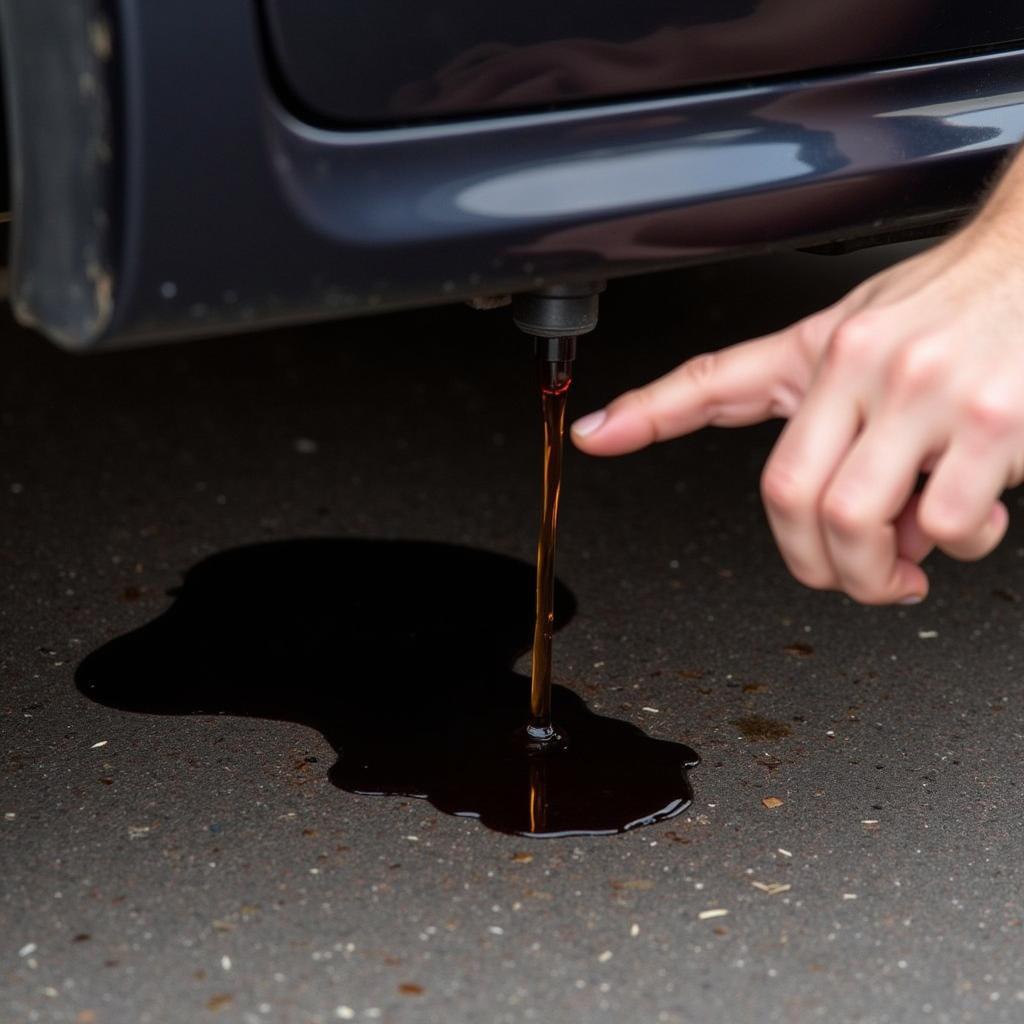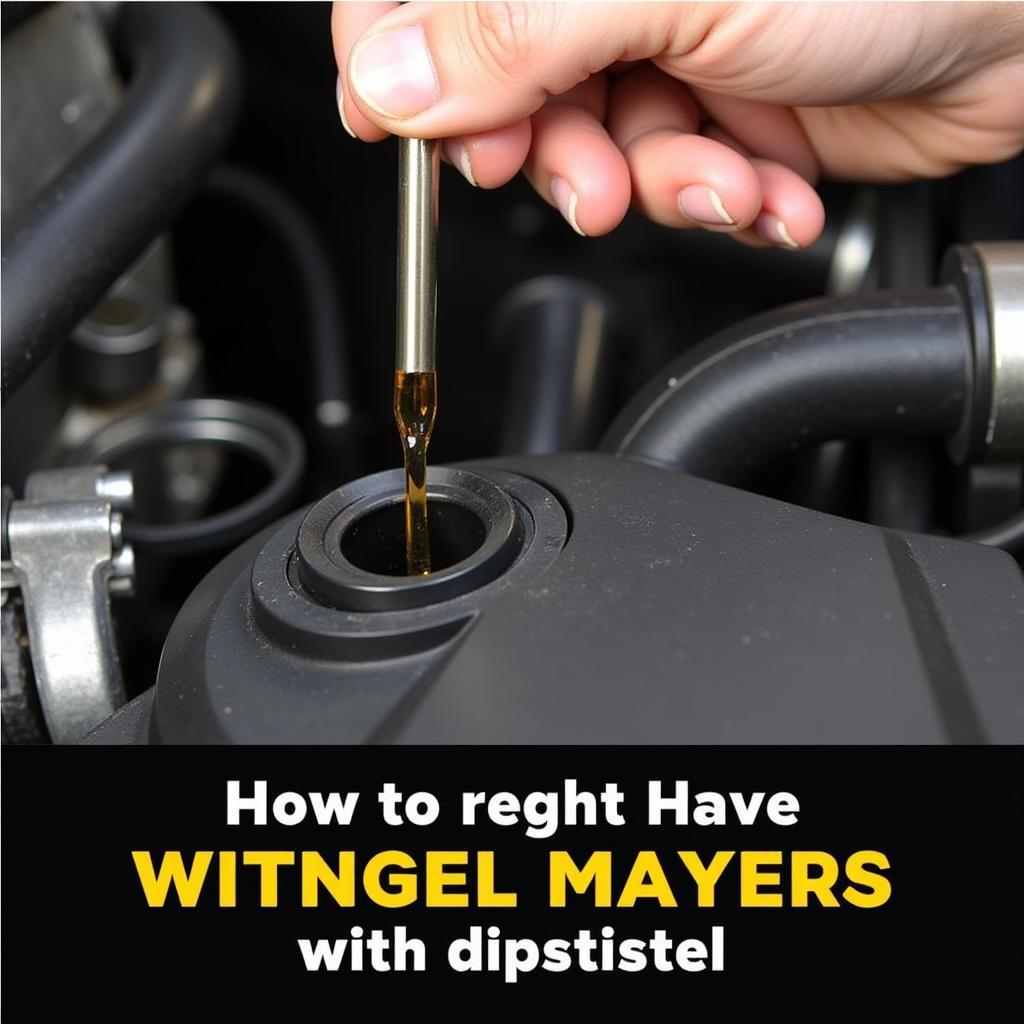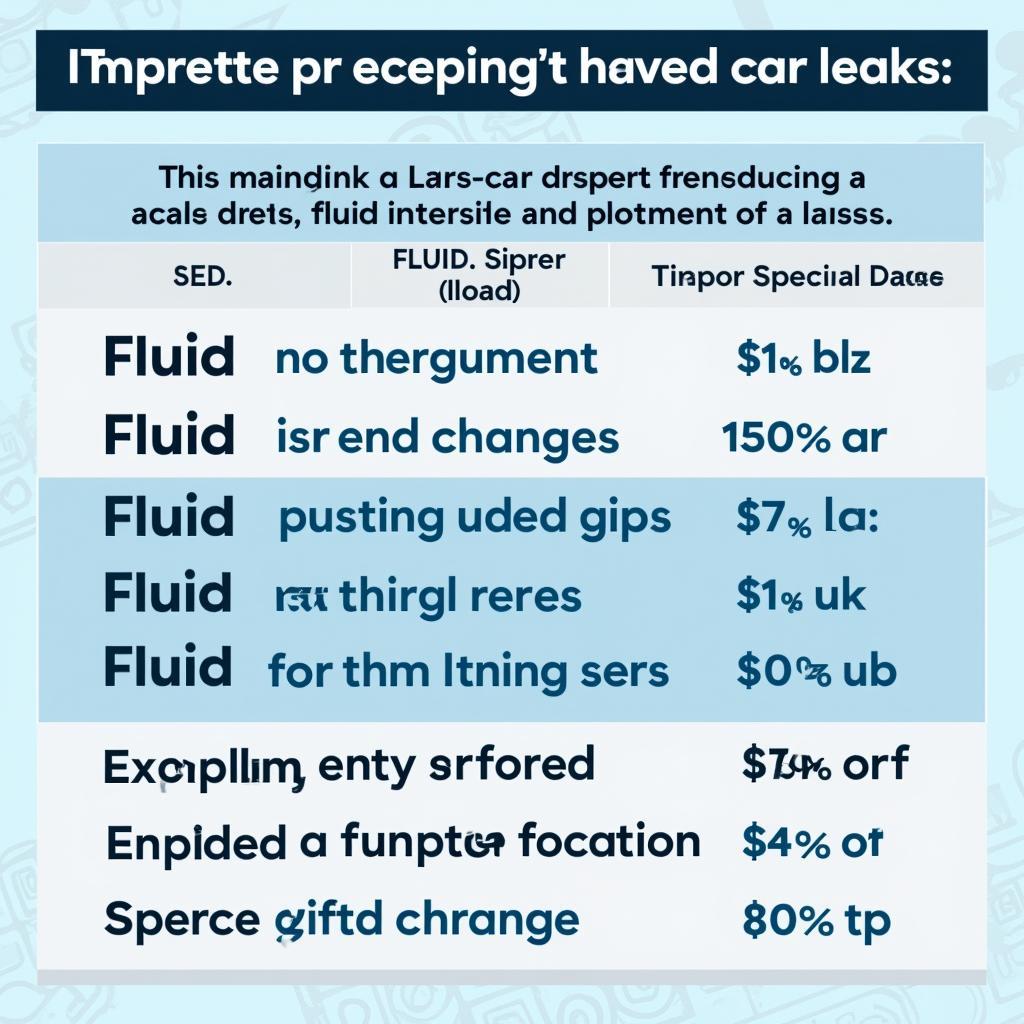Finding a reliable “Car Leak Fix Near Me” can be crucial when your vehicle springs a leak. Leaks can range from minor inconveniences to serious mechanical issues, impacting performance, safety, and resale value. This guide will help you identify common car leaks, understand their potential causes, and decide on the best course of action, whether it’s a DIY fix or seeking professional help.
Identifying the source and type of leak is the first step. Different fluids have distinct characteristics: engine oil is typically brown or black and greasy, coolant is often green, pink, or orange and sweet-smelling, while brake fluid is usually clear or slightly yellow and has a sharp, chemical odor. Transmission fluid, often red or brown, has a slightly sweet odor. Power steering fluid, which can be red, pink, or clear, has a distinct burnt odor. Locating the leak’s position under your car can give you valuable clues about the affected system. A leak towards the front might indicate an issue with the engine, radiator, or power steering, while a leak towards the rear could point to a differential or transmission problem.
Common Car Leaks and Their Causes
One of the most common leaks is an oil leak. These can stem from a worn-out oil pan gasket, a faulty valve cover gasket, or a damaged crankshaft seal. Coolant leaks, on the other hand, can be caused by a cracked radiator, a leaking hose, or a malfunctioning water pump. Brake fluid leaks, which are a serious safety concern, are often due to worn brake lines, damaged calipers, or a leaking master cylinder. Transmission fluid leaks can arise from a cracked transmission pan, a worn-out seal, or a failing gasket. Finally, power steering fluid leaks often originate from a leaking hose, a faulty power steering pump, or a damaged rack and pinion.
 Identifying a Car Oil Leak
Identifying a Car Oil Leak
What to Do When You Discover a Car Leak
If you discover a leak, the first step is to assess its severity. A small, slow leak might not require immediate attention, but a large or rapid leak demands prompt action. Check your fluid levels regularly and monitor the leak’s progression. If you’re unsure about the cause or the severity, consult a professional mechanic. Don’t delay seeking professional help if the leak involves brake fluid, as this poses a significant safety risk. Remember, even minor leaks can worsen over time and lead to more extensive damage.
 Checking Car Fluid Levels
Checking Car Fluid Levels
Finding a “Car Leak Fix Near Me”
When searching for a “car leak fix near me,” prioritize reputable repair shops with experienced technicians. Online reviews and recommendations from friends and family can be invaluable. Ask for quotes from multiple shops and compare their services and prices. A good repair shop will thoroughly diagnose the leak, explain the necessary repairs, and provide a transparent estimate. Don’t hesitate to ask questions and ensure you understand the scope of work before authorizing any repairs.
DIY Car Leak Fixes
Some minor leaks, like a loose hose clamp or a small oil leak, might be addressable with basic DIY skills. However, more complex leaks, especially those involving critical systems like brakes or transmission, require specialized knowledge and tools. If you’re comfortable working on your car, research the specific leak and gather the necessary materials. Always follow safety precautions and consult a repair manual before attempting any repairs. Even seemingly simple repairs can cause further damage if done incorrectly. Much like fixing a cracked car frame, addressing leaks requires precision.
Similar to how to fix a broken thermostat on a car, understanding the underlying system is essential for effective repair. If you are unsure about anything, it’s always best to seek professional help.
Preventing Car Leaks
Regular maintenance is key to preventing car leaks. Follow your car’s recommended maintenance schedule for fluid changes, inspections, and part replacements. This proactive approach can help identify potential issues before they escalate into major leaks. Inspect your car regularly for signs of leaks, such as puddles under the car or low fluid levels. Address any minor leaks promptly to prevent them from worsening.
 Car Maintenance Schedule
Car Maintenance Schedule
In conclusion, finding a reliable “car leak fix near me” requires understanding the nature of the leak and choosing the right course of action. Whether you opt for a DIY fix or seek professional help, addressing car leaks promptly is crucial for maintaining your vehicle’s performance, safety, and longevity. Don’t hesitate to connect with AutoTipPro at +1 (641) 206-8880 or visit our office at 500 N St Mary’s St, San Antonio, TX 78205, United States for expert advice and assistance with your car leak issues. Just like understanding how to fix car window alignment, knowing the right steps to take when you discover a leak is essential for car ownership. Also, if you’ve ever wondered how to fix a hole in your car muffler, you understand the importance of addressing automotive issues promptly.
FAQ
- How can I tell what type of fluid is leaking from my car?
- What are the most common causes of car leaks?
- Is it safe to drive my car if it’s leaking fluid?
- How much does it cost to fix a car leak?
- How can I prevent car leaks in the future?
- What should I do if I see a puddle under my car?
- When should I seek professional help for a car leak?
Remember, proper car maintenance is just as important as knowing how much money is it to fix a car mirror. Both contribute to the overall health and longevity of your vehicle.




Leave a Reply